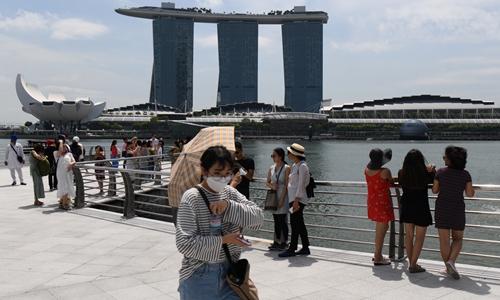HOME >> CHINA
Asian economies impose Draconian travel measures at significant costs
By GT staff reporters Source:Global Times Published: 2020/3/17 23:23:40

A visitor, wearing a protective facemask amid fears about the spread of the COVID-19, walks along Merlion Park in Singapore. Photo: AFP
More Asian countries and regions, especially those that are export-driven, have adopted Draconian measures in combating the novel coronavirus spread including closing the borders, strict movement restrictions and bans on international arrivals due to rising imported cases of infection, showing that public health is now the top priority regardless of the heavy costs to their economies. Their practice also inspires China to double efforts to prevent a rebound in infections.
China's Hong Kong Special Administrative Region (HKSAR) government announced on Tuesday plans to put all arrivals from foreign countries into quarantine from Thursday, extending red travel alerts to cover all countries and regions amid an intensifying pandemic situation outside the Chinese mainland, HKSAR Chief Executive Carrie Lam said during a press conference.
The country's Macao Special Administrative Region (SAR) also banned all arrivals from overseas to the SAR from Wednesday as the region saw new imported cases. On Sunday, the SAR recorded an imported case of infection who had traveled to Portugal, ending a 40-day record with no new confirmed case. Macao also recorded a new imported case from Spain on Tuesday, according to the local government's website.
Major Asian economies Malaysia and Singapore which are also transport and trading hubs, have been taking stricter measures in combating the novel coronavirus pneumonia (COVID-19). Malaysia's leader announced on Monday a drastic two-week lockdown in the country to slow the spread of the virus and during the period Malaysians will not be allowed to travel overseas and all foreign visitors will be banned, the AP reported.
Malaysia reported its first two deaths from the novel coronavirus on Tuesday, as the number of confirmed cases reached 673, according to the Straits Times.
On Sunday, Singapore announced new measures to reduce COVID-19 carriers from entering the city-state. Residents were advised to defer all non-essential travel abroad to reduce the risks of contracting the virus.
Singapore health officials confirmed 17 new cases on Monday, and over half were from foreign locations. Observers noted that the news should sound an alarm for Chinese cities that claimed victory over the pandemic.
Of the 11 imported cases, the patients had traveled to France, Spain, and the US, according to a press release from Singapore's Ministry of Health.
The confirmed infections also marked a biggest single-day spike for the city-state, the Straits Times reported, as the total number of infected patients stands at 243.
Analysts warned that border closures have a limited effect. After the US announced a travel ban against Europe, travelers from the continent rushed to major airports in the US, accelerating the spread of COVID-19.
"For smaller countries, shutting down is a double-edged sword, as their disease prevention and medical resources are limited, and a temporary shutdown may be relatively safe, but those countries are more dependent on global resources and supply chains," Chen Xi, an assistant professor of public health at Yale University, told the Global Times on Monday.
Country shutdowns also cause significant economic losses, which might not be favorable for epidemic prevention work, Chen added.
Currently, quarantine measures and travel bans are having a devastating impact on Asia-Pacific tourism, heavily weighing on their overall GDPs as the sector accounts for a high share of total GDP for countries such as Malaysia, Singapore and Thailand.
A collapse in international tourism travel is hitting hotels, restaurants and airlines across most Asia-Pacific nations. Millions of jobs in the Asia-Pacific tourism and travel industry will be lost in coming months if the COVID-19 pandemic cannot be contained quickly. Countries like Thailand, Vietnam and Singapore have significant tourism industries, and the impact of the quarantine measures and travel restrictions will have a significant negative impact on tourism, according to analysts.
"However as public health is now the policy priority, Asia-Pacific governments as well as governments in other regions such as Europe and North America are implementing severe measures to restrict the spread of the COVID-19 pandemic, and are accepting the high economic costs to their national output and employment," Rajiv Biswas, Asia-Pacific chief economist of IHS Markit, told the Global Times on Tuesday.
In order to mitigate the economic costs and to help consumers and businesses, many governments are implementing fiscal and monetary policy stimulus measures to try to reduce the overall negative impact of the pandemic on their economies, he said.
Newspaper headline: Asian economies place travel bans at costs
RELATED ARTICLES:
Posted in: DIPLOMACY